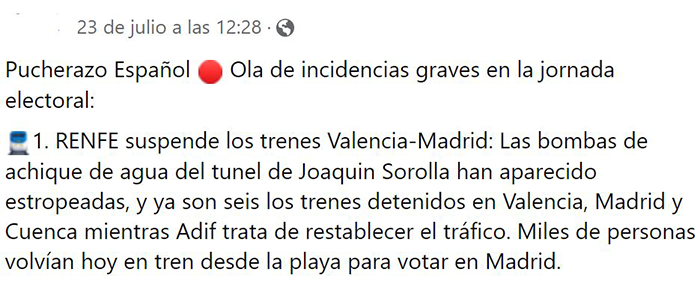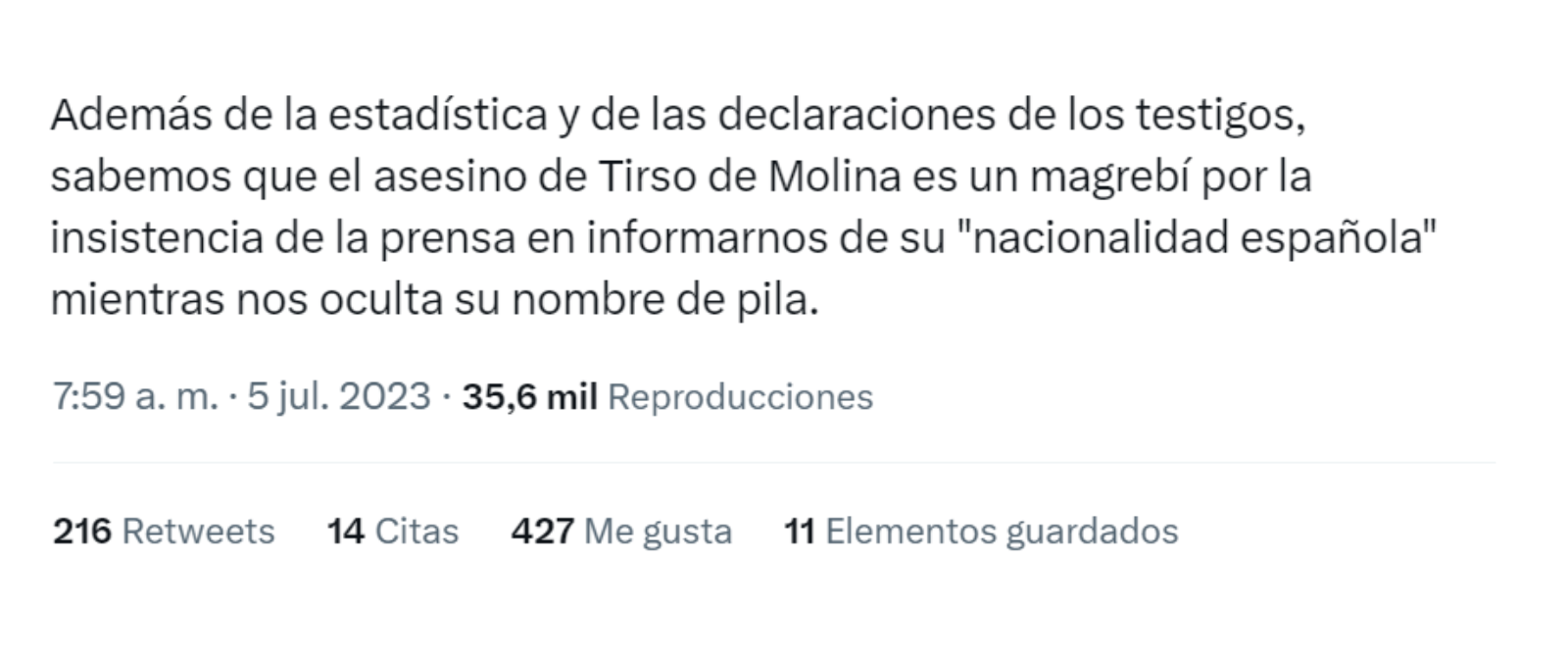The snap general election in Spain on 23 July, 2023 came as a surprise to even the most acute political observers. The manoeuvre to hold a snap election was a direct result of a poor performance by the ruling political party, PSOE, in regional and local elections in May 2023. Spain is considered a functional democracy, but is also highly polarised, and the heightened political tension leading up to the election – as conservative and far-right parties attempted to form a coalition government – was expected to further deteriorate online political discourse and foster the prevalence of disinformation.
The Spanish anti-disinformation non-profit Fundación Maldita.es, in partnership and with support by Democracy Reporting International, has monitored the election to understand online political discourse made by politicians and other political actors and monitor the main disinformation and hate narratives circulating online during the campaign. We monitored four of the main social media platforms used in Spain: Twitter, Facebook, YouTube, and TikTok.
Our main findings are as follows:
- There was a clear and sustained disinformation operation to delegitimise the integrity of the Spanish electoral system, and undermine the public trust in free and fair elections in the country. Some of the false claims and narratives received support from party-affiliated actors and elected officials.
- The anti-migrant disinformation narratives were the most common form of hate expressed online during the campaign, frequently used to deride political proposals, denigrate Spain’s non-native population, and place immigration under a harsh light.
- Both narratives counted on the support of prominent figures in party politics and elected officials, who amplified false or misleading claims during the campaign, helping them reach a much wider audience and further polarise voters.
Our research is structured on three main pillars of analysis:
- Attacks on the integrity of the election and hate towards migrants
- How politicians and parties campaigned online
- The intersection between online political speech, disinformation and hate.
We conducted an analysis of publications and engagement levels of selected party-linked accounts on four different digital platforms: Twitter, Facebook, TikTok, Instagram, and YouTube. For this, we selected a sample of priority accounts of political figures, including candidates, regional authorities, or party officials, and the official accounts of the political parties themselves, as well as of a few other influential party-linked individuals (key for understanding the political landscape). We supplemented the monitoring of this panel of selected accounts with our standard methodology to track disinformation narratives.
We analysed content published between 24 June and 23 July, or the period of 30 days before the election, plus Election Day itself. Our selected panel produced a total of 142,000 publications from 829 unique authors and obtained a combined reach of 5.8 billion views across platforms. Without a doubt, Twitter was the preferred platform for the political actors in our sample to influence the conversation, with approximately 87% of the analysed content published there.
For further information on our methods and selection sample, please see our methodological note at the end of this piece.
Attacks on electoral integrity and anti-migrant hate
Electoral integrity
Spain has a history of disinformation targeting election integrity. Maldita.es has documented such claims as early as 2017; many of these trends in electoral fraud narratives and allegations are comparable to claims seen in the United States or Brazil that were later adopted as a justification for political violence (the Capitol Siege in the US in 2021 or the assault on the Brazilian Parliament in 2023). Though not new, many of these claims intensified during the 2023 election cycle.
In our selected sample, we identified social media publications containing already debunked disinformation. Among them, 24% of posts in the total observation period referenced the integrity of the election process. But, as a per cent of the total publications in the week of the election, the category represents 40%, growing to 74% of those posted on Election Day. The trend illustrates an increased attempt to dissuade voters from trusting the election as the day grew closer.
One key focus of the disinformation campaign was to undermine the credibility of mail-in voting, either through the use of absentee ballots or through the CERA registry of Spanish voters living in foreign countries. Sixty-five per cent of all disinformation publications regarding electoral integrity published during this period were about mail-in voting.
Of the publications Maldita.es flagged on Election Day as containing disinformation, 74% were considered intent on undermining public confidence in a free and fair election. The single most shared claim implied that the government had engineered a fire in a tunnel in order to stop train traffic between Madrid and Valencia and “lock” voters from coming back to their cities to vote.
| Tweet 1 | Translation 1 |
 | July 23, 12:28 Spanish Fraud. A wave of grave incidents on Election Day. RENFE suspends the trains between Madrid and Valencia. The pumps to drain water from the tunnel at Joaquín Sorolla are broken and there are now six trains stopped at Valencia, Madrid, and Cuenca as ADIF tries to reestablish circulation. Thousands were coming back today from the beach to vote in Madrid. |
This viral claim on election day is one example of many that received widespread dissemination and attention. It aims to discredit the fairness of the election and could potentially alienate thousands of people from recognising its integrity. Most claims were aimed at PSOE, the socialist party, widely (and incorrectly) seen as responsible for the administration of the election, but some also claimed foul play on the side of the opposition Partido Popular.
Hate campaign
Of all content flagged by Maldita.es as disinformation during the observation period, 32% contained hate speech – that is speech designed to promote violence or negative stereotypes of some groups because of their race, religion, sexual orientation or other inherent characteristics, including those that promote fascism or military rule.
!function(e,n,i,s){var d=”InfogramEmbeds”;var o=e.getElementsByTagName(n)[0];if(window[d]&&window[d].initialized)window[d].process&&window[d].process();else if(!e.getElementById(i)){var r=e.createElement(n);r.async=1,r.id=i,r.src=s,o.parentNode.insertBefore(r,o)}}(document,”script”,”infogram-async”,”https://e.infogram.com/js/dist/embed-loader-min.js”);Racist disinformation in our sample reflects long-standing narratives which associate migrants and people of colour with crime, accusing them of monopolising public welfare, or for supposedly imposing their own views on society on the basis of religious beliefs.
!function(e,n,i,s){var d=”InfogramEmbeds”;var o=e.getElementsByTagName(n)[0];if(window[d]&&window[d].initialized)window[d].process&&window[d].process();else if(!e.getElementById(i)){var r=e.createElement(n);r.async=1,r.id=i,r.src=s,o.parentNode.insertBefore(r,o)}}(document,”script”,”infogram-async”,”https://e.infogram.com/js/dist/embed-loader-min.js”);There is a very active online community of accounts disseminating damaging narratives, many falsely accusing persons of colour of committing a crime. In our sample, around 60% of content Maldita.es labelled as racist narratives (specifically, criminalising people of colour), also contained verifiable false information related to current civil unrest in France. These publications were often accompanied by “cautionary messages” that riots might be in Spain’s future if immigration is not curtailed.
Of note is one high-profile crime with widespread coverage online. A woman was murdered in broad daylight in Madrid, a very uncommon event. Online, the murder was widely and falsely blamed on immigrants. There was at least one such coordinated online effort to place the blame on a “North African” person. After police statements contradicted this false claim (the individuals arrested were Spanish), the disinformation campaign pivoted by arguing that the attackers were “of Moroccan origin”. Now in prison, both attackers are native-born and carry traditional Spanish-sounding names.
| Tweet 2 | Translation 2 |
 | “A North African stabs Concha to death, the owner of a shop in Madrid’s downtown, after robbing her… This murder will not open newscasts, will not be considered sexist because a moor did it… Spain is about to look like France, continue the do-goodism”. |
| Tweet 3 | Translation 3 |
 | “Beyond statistics and statements from witnesses, we know the murderer of Tirso de Molina is a North African because the press insists on telling us about his “Spanish citizenship” while concealing his given name. |
Finally, anti-migrant online narratives also emerged in the form of politically targeted attacks against the Sumar party. There were viral hoaxes positing their electoral promises as provoking a migration exodus in Morocco towards Spain and proposing open land borders with Morocco. Other narratives purported that minors with a migrant background were “provoking panic” and pickpocketing in the party’s final election rally.
How politicians and parties campaigned online
In our observation period between 24 June and 23 July, our selected panel of political actors produced a total of 142,000 publications from 829 unique authors and obtained a combined reach of 5.8 billion views across platforms.
Volume, engagement, and related political events
There was a gradual increase in publications by our selected panel towards the end of the official campaign period. Considering the overlap with previous contentious municipal and regional elections, this is even more notable. The average reach of the posts in the panel also saw a very similar increase during the campaign, gaining, on average, 32% more impressions than compared to posts in the previous month. While 21% of the posts were classified as having a negative sentiment, this represents an increase of negative sentiment (up by 48%) in comparison to the previous time period.
!function(e,n,i,s){var d=”InfogramEmbeds”;var o=e.getElementsByTagName(n)[0];if(window[d]&&window[d].initialized)window[d].process&&window[d].process();else if(!e.getElementById(i)){var r=e.createElement(n);r.async=1,r.id=i,r.src=s,o.parentNode.insertBefore(r,o)}}(document,”script”,”infogram-async”,”https://e.infogram.com/js/dist/embed-loader-min.js”);The increase in activity from our selected panel reflects the established importance of social media in elections. Aside from the expected high volume of publications on the official beginning and end of the official campaigning period (7-22 July), the days of the three televised electoral debates cumulatively can be correlated with the spike in social media posts, garnering 15% of the total posts during the observation period month. This reflects the interactivity of the televised debate with online discourse, where the debate was amplified and continued even after it had officially ended.
In particular, the day of the only debate between Pedro Sánchez (PSOE) and Alberto Núñez Feijóo (PP) became the date with the highest number of publications, 46% of all posts collected, from the start of the debate at 10 pm onwards. The hashtag of the debate (#caraacaraatresmedia) was used in 32% of the 8,065 publications of the selected panel on 10 July.
Along party lines
Among the different political parties participating in this general election, the biggest national ones (PSOE, VOX, PP and Sumar) contributed the most to the online conversation.
!function(e,n,i,s){var d=”InfogramEmbeds”;var o=e.getElementsByTagName(n)[0];if(window[d]&&window[d].initialized)window[d].process&&window[d].process();else if(!e.getElementById(i)){var r=e.createElement(n);r.async=1,r.id=i,r.src=s,o.parentNode.insertBefore(r,o)}}(document,”script”,”infogram-async”,”https://e.infogram.com/js/dist/embed-loader-min.js”);Topics: the campaign and beyond
Half (50%) of the contents published by the panel during the observation period were explicitly related to the electoral campaign, using the official hashtags of each political party or referencing the elections.
The most addressed topics were:
- National identity and regional differences,
- Social rights
- Equality
- Economy
- International affairs
Nonetheless, posts regarding gender and LGBT+ rights (under the topic of ‘Equality’) had a higher reach, reflecting the importance those topics played in these elections.
!function(e,n,i,s){var d=”InfogramEmbeds”;var o=e.getElementsByTagName(n)[0];if(window[d]&&window[d].initialized)window[d].process&&window[d].process();else if(!e.getElementById(i)){var r=e.createElement(n);r.async=1,r.id=i,r.src=s,o.parentNode.insertBefore(r,o)}}(document,”script”,”infogram-async”,”https://e.infogram.com/js/dist/embed-loader-min.js”);Specific peaks in the volume of publications and the number of re-shares in these topical categories could be correlated with relevant events in Spanish politics. For instance, the International LGBTQ+ Pride Day (28 June) boosted posts on the ‘Equality’ topic category, while the anniversary of the murder of Miguel Ángel Blanco – assassinated by pro-independence Basque terrorist group ETA in 1997 – and the European Parliament’s voting on the EU Natural Restoration Law did the same for the ‘National identity and regional differences’ and the ‘Climate’ categories, respectively. Likewise, the necessity of agreements under coalition governments, both after the municipal and regional elections and the hypothetical governments from the result of the general election, boosted the topic’s relevance in our data set (‘Coalition deals’).
The intersection between political online speech, disinformation, and hate
Political amplification of disinformation online
During this period, we saw many pieces of disinformation amplified by political figures, contributing to the narratives to advance their political interests (see below). This not only caused an increase in the reach of disinformation content but provided them with a heightened sense of credibility. Here are a few examples of content, debunked by Maldita.es, that were replicated by important authorities:
- The PSOE candidate and current prime minister Pedro Sánchez tweeted a graph painting a rosy – but misleading – financial outlook for the public pension system. The publication reached 7.5 million impressions.
- The opposition leader and PP candidate Alberto Núñez Feijoo repeatedly claimed during the campaign that his party had “always” raised public pensions according to the official cost of living index, which was false. In this tweet, seen by 3.9 million he offuscated his past statements on the matter to make it appear that he did not lie.
- The leader of the far-right party VOX shared a publication with over 5.5 million views supporting the aforementioned hoax that a North-African immigrant was responsible for the murder of a woman that took place in Madrid shortly before the campaign. Again, the two suspects were of Spanish nationality and born in Spain. The Hate Crimes Prosecutor is reported to be investigating this specific hoax.
- Yolanda Díaz, leader of Sumar, also echoed a viral hoax through a tweet that reached 1,9M impressions with the headline: “VOX proposes to kill the dogs that nobody adopts”. The origin of the content is in a proposal from a Zaragoza councillor at a council meeting in 2019 which did not prosper, and the proposal is not mentioned in the party’s program.
Sentiment and negativity
We saw a correlation between disinformation, hate speech and the political conversation online reflected in the negative sentiment of the publications of the political actors’ panel. When scanned automatically for a sentiment check, the publication in the categories of ‘Security’, ‘Migration’, and ‘Equality’ had the highest percentage of negativity.
!function(e,n,i,s){var d=”InfogramEmbeds”;var o=e.getElementsByTagName(n)[0];if(window[d]&&window[d].initialized)window[d].process&&window[d].process();else if(!e.getElementById(i)){var r=e.createElement(n);r.async=1,r.id=i,r.src=s,o.parentNode.insertBefore(r,o)}}(document,”script”,”infogram-async”,”https://e.infogram.com/js/dist/embed-loader-min.js”);Concerning patterns
Upon more examination of the ‘Migration’ category, phrases like “illegal immigration”, “illegal immigrants”, and “mass immigration policy” were the most repeated phrases in the publications authored by the panel. The phrase “what is occurring in France” is also among the most mentioned. Specifically, VOX gathered 70% of the publications in the panel that contained the keyword ‘France’, which can demonstrate how relevant French riots and protests were framed in Spain to push an anti-immigrant agenda.
Regarding mail-in voting disinformation and narratives: 21% of posts by political actors mentioning vote by mail had a negative sentiment, either because the publication replicated narratives containing disinformation or accused others of promoting suspicions of electoral fraud.
Thinking about the future
We have seen a steady increase in disinformation against the integrity of electoral process in Spain that are in line with global trends in election disinformation. The risk of physical harm and civil unrest (in the fashion of the Capitol siege in the US or the assault of Congress in Brazil) is real. It is not unforeseeable that this kind of political violence could occur in Spain if one of the major political parties crosses the line and adopts narratives of ‘electoral fraud’, as is already present among their bases.
It is clear that much of the viral disinformation about the election process is more effective because of general ignorance about the procedures of mail voting, vote counting, and other aspects of the election administration. For the kind of election literacy campaign required to address the problem, credible and non-political messengers are needed, plus resources and collaboration from relevant actors, including the media, very large online platforms (VLOPs), and online influencers. Such an election campaign could be coordinated by Spanish civil society or the electoral administration itself.
Regarding VLOPs, we observed a lot of harmful disinformation on their services that was against their internal policies but appeared either unacted upon by the platform or that, in some occasions, was removed. We need interventions by those platforms that provide information to the user on the accuracy or risk of a claim, not a removal that offers no help to the user that had already consumed that disinformation. Those interventions are not impossible to implement and get results, as we saw in the low engagement of the content flagged as disinformation by independent fact-checkers and actioned upon by Facebook. VLOPs can invest more in these ‘nudging’ interventions as part of their commitment to the Code of Practice on Disinformation.
While monitoring public content on digital platforms is always challenging, doing that on non-text-based platforms like YouTube, TikTok, and Instagram was extremely difficult. Those platforms need to provide fact-checkers and researchers with the tools to do a better job in that respect, in agreement with their obligations to improve their collaborations with fact-checking teams under the EU Digital Services Act and Code of Practice on Disinformation.
Politicians need to do a better job of not amplifying disinformation and hate online (and they need to be held accountable if they do). Digital platforms need to evaluate and take into account the role of these figures when designing their policies for dealing with those phenomena, particularly around elections.
Methodology
The monitoring period started on June 24 and ended on July 23, Election Day. The contents considered as disinformation for the purpose of this study were identified as such according to the process described in Fundacion Maldita.es public methodology for debunking. The ones that additionally are flagged as also containing hate speech are the ones considered by Fundacion Maldita.es analysts as consistent with the United Nations definition of “offensive discourse targeting a group or an individual based on inherent characteristics (such as race, religion or gender) and that may threaten social peace”, including those that glorify fascism or military rule, or were designed to promote violence or negative stereotypes of some groups because of their race, religion, sexual orientation or other inherent characteristics.
The selected panel of political actors included around 600 politicians, elected officials, party-affiliated figures, and the parties and their affiliated entities themselves. Many of those actors were monitored on several digital platforms where they had a presence. The sentiment analysis relied on an automated tool, Brandwatch, that uses a model based on AI-powered computational linguistics such as Natural Language Processing (NLP) to recognise not only the words used, but also the tone, structure, possible sarcasm or irony, plus the use of emojis and other ways to communicate sentiment.
